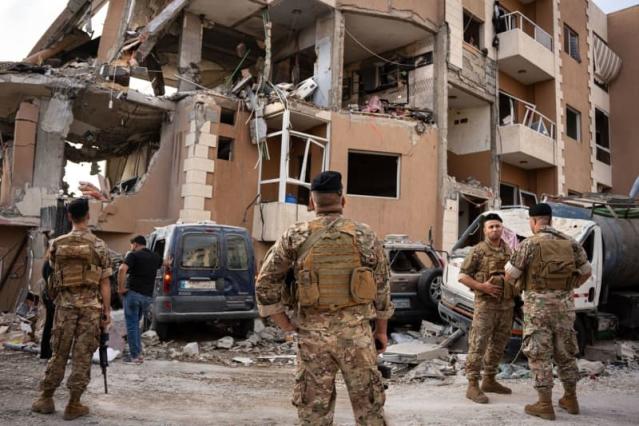Foreign News
Air Force on fact finding mission over alleged killing of innocents in Zamfara

…As Blast, gunfire announce attackers hitting Afghan communications ministry, in central Kabul***
A team of Nigerian Air Force officers, led by AVM Idi Lubo, on Friday arrived Zamfara to investigate allegations that innocent citizens were recently bombarded through air strikes by NAF personnel in the state.
Addressing journalists on arrival at the 307 Quick Response Group headquarters in Gusau, the team leader, Lubo said “the Chief of Air Staff, Air Marshall Sadique Abubakar is highly disturbed over the allegations.
“As concerned Nigerians and part of those charged with the responsibility of ensuring the peace and safety of Nigerians, we are here to verify the claims made by the traditional rulers of Zamfara.
“We will meet with all stakeholders in the matter, especially the state government, security chiefs and even the affected community members before filing our report.”
Report says that the team had on arrival in the evening, separately met with the state Director, Department of State Security and the Secretary to the State Government behind closed door.
There is a report that the state Council of Chiefs had a fortnight ago, accused the air force under the on-going Operation Sharan Daji of hitting wrong targets and killing innocent citizens instead of bandits.
Although the headquarters of the Nigeria Air Force had denied the allegations, the council followed the claim with the list of victims.
The state has been under bandits attacks in the last seven years, during which about 5,000 persons were said to have been killed, thousands of animals rustled and property either burnt or destroyed.
In the meantime, gunmen attacked the communications ministry in the centre of Kabul on Saturday, interrupting months of relative calm in the Afghan capital and underlining security threats that have continued in spite of efforts to open peace talks with the Taliban.
Saturday’s attack opened shortly before midday with an explosion at the entrance to the multi-storey building housing the ministry in a busy commercial area of the city, followed up by gunfire which could be heard over a mile away.
The area around the building was sealed off by police as at least three attackers battled security forces, Interior Ministry spokesman Nasrat Rahimi said.
By early afternoon, he said at least two of the attackers had been killed and gunfire could no longer be heard. However, there was no confirmation that the attack was over.
The explosion, which security officials said appeared to have been caused by a suicide bomber, was also close to the heavily fortified Serena Hotel, one of the very few Kabul hotels still used by foreign visitors.
There was no immediate word on further casualties and no claim of responsibility for the operation.
The attack marked a return to the kind of complex urban attack that have been familiar features of the Afghan conflict over recent years.
Hundreds of people have been killed in Kabul in attacks by militant groups including the Taliban and Islamic State.
But as U.S. officials have held a series of meetings with representatives from the Taliban, Kabul has been relatively calm.
While heavy fighting has carried on across Afghanistan and Taliban militants have announced their now customary spring offensive, it had been several months since the last major attack on civilian targets in the capital.
The attack, just days after a planned meeting between Taliban officials and Afghan politicians and civil society representatives in Qatar was cancelled, underlined the hurdles facing efforts to reach a peace settlement.
Officials have said they hope to hold a meeting soon but no date has been set.

Foreign News
Syrian Mass Graves Expose “Machinery of Death” Under Assad, Top Prosecutor Says

An international war crimes prosecutor Stephen Rapp said evidence emerging from mass grave sites in Syria has exposed a state-run “machinery of death” under toppled leader Bashar al-Assad.
According to Rapp more than 100,000 people have been tortured and murdered since 2013.
Speaking after visiting two mass grave sites in the towns of Qutayfah and Najha near Damascus, former U.S. war crimes ambassador at large Stephen Rapp said “We certainly have more than 100,000 people that were disappeared into and tortured to death in this machine.
“I don’t have much doubt about those kinds of numbers given what we’ve seen in these mass graves. We haven’t seen anything quite like this since the Nazis.’’
Rapp led prosecutions at the Rwanda and Sierra Leone war crimes tribunals and is working with Syrian civil society to document war crimes evidence and also helping to prepare for any eventual trials.
He added, “From the secret police who disappeared people from their streets and homes to the jailers and interrogators who starved and tortured them to death, to the truck drivers and bulldozer drivers who hid their bodies, thousands of people were working in this system of killing.
“We are talking about a system of state terror, which became a machinery of death.”
Hundreds of thousands of Syrians are estimated to have been killed since 2011 when Assad’s crackdown on protests against him spiralled into a full-scale war.
Both Assad and his father Hafez, who preceded him as president and died in the year 2000, have long been accused by rights groups and governments of widespread extrajudicial killings, including mass executions within the country’s prison system and using chemical weapons against the Syrian people.
Assad, who fled to Moscow, had repeatedly denied that his government committed human rights violations and painted his detractors as extremists.
The head of U.S.-based Syrian advocacy organisation the Syrian Emergency Task Force, Mouaz Moustafa, who also visited Qutayfah, 25 miles (40 km) north of Damascus, has estimated at least 100,000 bodies were buried there alone.
The International Commission on Missing Persons in The Hague separately said it had received data indicating there may be as many as 66, as yet unverified, mass grave sites in Syria. More than 157,000 people have been reported missing to the commission.
Commission head Kathryne Bomberger told Reuters its portal for reporting the missing was now “exploding” with new contacts from families.
By comparison, roughly 40,000 people went missing during the Balkan wars of the 1990s.
Bomberger said for the families, the search for the truth in Syria could be long and difficult. A DNA match will require at least three relatives to provide DNA reference samples and take a DNA sample from each skeletal remains found in the graves.
The commission called for sites to be protected so that evidence was preserved for potential trials, but the mass grave sites were easily accessible on Tuesday.
The State Department of the United States is engaged with several UN bodies to ensure that the Syrian people receive answers and accountability.
Syrian residents living near Qutayfah, a former military base where one of the sites was located, and a cemetery in Najha used to hide bodies from detention sites described seeing a steady stream of refrigeration trucks delivering bodies which were dumped into long trenches dug with bulldozers.
Abb Khalid, who works as a farmer next to Najha cemetery, “The graves were prepared in an organised manner the truck would come, unload the cargo it had, and leave. There were security vehicles with them, and no one was allowed to approach, anyone who got close used to go down with them.’’
In Qutayfah, residents declined to speak on camera or use their names for fear of retribution, saying they were not yet sure the area was safe after Assad’s fall. “This is the place of horrors.’’
Inside a site enclosed with cement walls, three children played near a Russian-made military satellite vehicle. The soil was flat and levelled, with straight long marks where the bodies were believed buried.
Reuters
Foreign News
Israeli Parliament Passes Law Banning UNRWA From Operating In Israel

The Israeli parliament, the Knesset, has passed a law prohibiting the United Nations Relief and
Works Agency for Palestine Refugees in the Near East (UNRWA) from operating in Israel.
According to local media reports, the new law, which received support from 92 out of 120 parliament members, passed despite opposition from the United States and several European countries.
The law stipulates that UNRWA will not operate any representation, provide services, or conduct any activities, directly or indirectly, within Israeli territory.
“As it is proven that UNRWA and its employees participate and are involved in terrorist activity against Israel.
“It is proposed to establish that Israel will act to stop all activities of the agency in its territory,” the explanatory notes to the law read.
In a post on X, Philippe Lazzarini, commissioner-general of UNRWA, said the vote by the Israeli Parliament against UNRWA “is
unprecedented and sets a dangerous precedent.”
“It opposes the UN Charter and violates the State of Israel’s obligations under international law.
“These bills would only deepen the suffering of Palestinians, especially in Gaza where people have been going through more than a year of sheer hell,” he wrote.
– Xinhua
Foreign News
Lebanese Military Reports Troops Killed In Israel-Hezbollah Conflict

…As EU ministers sanction Iran over missiles supplied to Russia
Four soldiers from the Lebanese army have died in the conflict between the Hezbollah militia and Israel, and a further 12 Lebanese soldiers have been killed while not on duty, army sources told DPA.
Two soldiers were recently killed by Israeli fire while on duty at a military post in Kafra in the south of the country, the Lebanese army said.
Lebanon’s military was seen as weak and under-resourced.
It was not directly involved in the conflict between Israel and Iran-backed Hezbollah.
It has partially withdrawn from positions along the country’s southern border with Israel since the Israeli ground offensive began two weeks ago.
The army did, however, return fire when one of its bases in Bint Jbeil in the south came under Israeli attack.
In another development, the EU foreign ministers adopted sanctions on Iran for supplying Russia with ballistic missiles for use in Ukraine on Monday.
Diplomats told DPA that the EU sanctions target companies and individuals involved in Iran’s ballistic missile programme and the delivery of these and other weapons to Russia.
The European Union had previously warned Iran several times against passing on ballistic missiles to Moscow and views the step as breaching a new taboo.
Iran has vehemently denied supplying Russia with the weapons.
According to Tehran, the country has a strategic cooperation with Moscow, although this is not related to the war in Ukraine.
Tehran maintains that providing military aid to warring parties is inhumane.
One of the targets is the Iranian state airline Iran Air.
Britain, Germany and France have already announced they are working on sanctions targeting the company.
The EU sanctions, including a freeze on assets held in the bloc and a travel ban on individuals, will enter into force upon their publication in the EU Official Journal, a register of EU laws.
EU foreign ministers are meeting to debate the escalating conflict in the Middle East and the EU’s efforts to support Ukraine against the Russian invasion, despite Hungarian resistance.
The bloc also plans to hit Russian actors and organizations accused of destabilizing Moldova’s democracy and security with new sanctions ahead of a crunch referendum on EU membership later this month.
The role of Iran and its regional proxies Hezbollah in Lebanon and Hamas in Gaza will be in focus at the foreign ministers’ meeting in Luxembourg.
The EU is struggling to find a response that could help stop the conflict from spiralling into a full-scale regional war in the Middle East.
Top EU diplomat Josep Borrell voiced frustration over the bloc’s discordance on an increasingly tense Middle East conflict, especially concerning criticism of Israel.
“It takes too long to say some things which are quite evident,” he said upon arrival.
“It’s quite evident that we should be against Israeli attacks against UNIFIL, especially because our soldiers are there.”
He referred to a joint EU statement on recent attacks on the UN peacekeeping mission in southern Lebanon, issued on the eve of the gathering.
Borrell also said that EU countries are at odds over arms deliveries to Israel after Spain called for an embargo.
“Member states are strongly divided,” he said, adding that other EU countries are in favour of delivering more weapons to Israel.
Another major issue is Hungary’s over-a-year blockade of a key EU military aid policy for Ukraine, the European Peace Facility (EPF), worth €6.6 billion ($7.2 billion).
Budapest does not want to send arms to Ukraine, believing that doing so only prolongs the war.
“Frankly speaking, it’s a lot of time, it’s a lot of money, and it’s undermining our political will of supporting Ukraine on any front,” an EU official said in a sign of growing EU impatience with Hungary.
The bloc’s diplomatic arm, the European External Action Service, has devised a plan to make contributions to the EPF fund voluntary instead of mandatory, as a technical workaround to Hungary’s opposition.
An EU diplomat said that Hungary has shown a willingness to agree to this solution.
New Ukrainian Foreign Minister Andrii Sybiha spoke with EU foreign ministers via video link.
Borrell welcomed his contribution in a post on X and promised new deliveries of weapons for Ukraine.
British Foreign Minister David Lammy is also in Luxembourg, the first time a British foreign minister has attended a gathering of EU foreign ministers alone since Britain left the EU in 2020.
– dpa





























